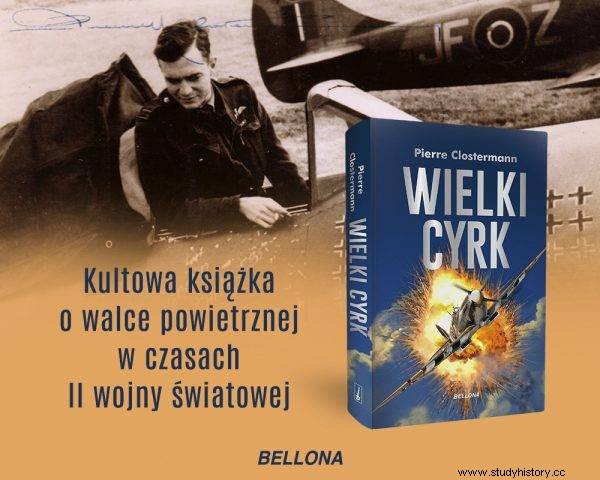Pierre Clostermann's opponents crashed or drowned. He is glorified as a fighter ace. After the war, he described the hell of aerial combat.
Throughout the week, Brooker drives Wing in hellish mode. Its three squadrons are losing 17 pilots. We are destroying Germany's 24 planes and 52 locomotives. In 274 Squadron there are only 11 pilots and 16 machines. It is simply impossible life. The supply service can get us new planes very quickly, but it is not so easy to find pilots on the Tempesta. In the morning of March 20, the service "Anson" brought us four sergeant pilots and one chief engineer. The last of these five recruits was killed on March 23. Our "old guard", exhausted by three daily outings, had enough work to save their own skin to be able to deal with the new comers.
Knocked down like a torch
Poor kids - freshly baked at OTU - were only on three or four hours of flights on Tempests. Frightened by those machines they had difficulty piloting, let themselves be massacred by flak and Messerschmitts 109 ...
Brown was one of the four sergeants. Immediately after his arrival at Volkel, at around 10:00 am, I was forced to instruct him to test the plots on one of our new Tempests in the morning. Brown went to the casino for breakfast with all his luggage, but before he could unload it, he was recalled to the dispersal and sent into action. Flying under Hibbert in a span of four planes, Brown accosted a dozen Focke-Wulfs, quite accidentally damaging one of them and returning to base. Hibbert and Humphries were knocked down. That same evening, while the pilots went to the casino for tea, I kept him with me to keep on alert.

Pierre Clostermann's opponents crashed to the ground or drowned in the waters of the English Channel. He is glorified as a fighter ace.
After 10 minutes, we started the patrol over Wesel. We arrived at an altitude of 3,000 meters just in time to spot one more jet, the Messerschmitt 262, disappearing into the clouds. A second of disappointment and - instinctively - I withdraw. The four Focke-Wulfs fall on our necks and poor Brown is knocked down like a torch on the banks of the Rhine.
I complain bitterly of the situation to Brooker. Pilots are nervously exhausted, as evidenced by the enormous number of quite stupid accidents occurring over and over again:missed trains, collisions on the ground, burned brakes, punctured tires y, unsuccessful landing, long jump propeller take-offs ... My squadron cannot last longer - in the period from February 15 to March 15 out of 31 line personnel were killed or 24 pilots were missing . Of the pilots who made up this unit in Fairbanks' day, only two remained alive:a certain sergeant and me. Brooker, however, shows me a categorical command from the command:you must persevere until the crossing of the Rhine.
Dantesque spectacle
March 24, 1945. The first cover expedition sets off at 3.00 am over Wesel, attacked by the first commando brigade. A dense cloud of debris, dust and smoke still hovers over the city bombed by 150 Lancasters, each carrying two five-ton bombs. Within the airport, a monstrous mixture of Tempests and Spitfires, almost rubbing against each other in the dark and flying at 500 km / h. It takes a lot of nerves to last 10 minutes in this dance of green and red lights where you try to collect the patrolling keys. Nothing interesting to signal. At 10:00 AM we take off again to escort the 669 airplanes and 429 RAF gliders that arrived from England with the 6th British Paratroopers Division.
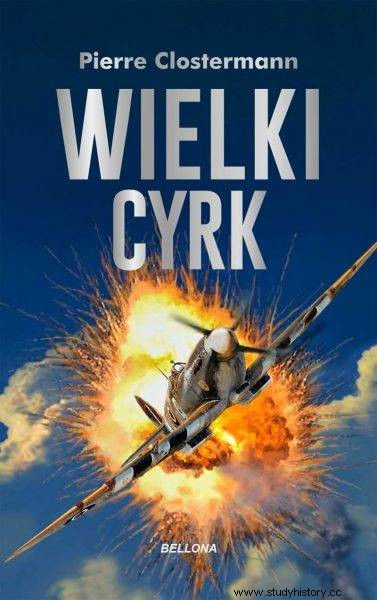
The text is an excerpt from Pierre Clostermann's book "The Great Circus" (Bellona, 2022).
It is a true Dantesque spectacle: thousands of white parachutes descend amid the hellish fire of heavy, medium and light anti-aircraft artillery while the Dakotas crash in fire and gliders crash on high-voltage lines in sheaves of flames and blue sparks. Typhoons attack all German anti-aircraft guns with rockets . Advanced radio control positions direct us to armored columns pulling to the front. German fighters do not actually intervene. Yesterday's massive bombing of Rheine and the tactical airfields temporarily disabled them.
Planes on fire
We fire machine guns at an armored train near Ringerberg and a group of tanks on the streets of Bocholt. We descend to the roofs, spitting fire from our four cannons ... The tiles are flying, flak bullets burst along the walls, trucks are on fire, terrified inhabitants are running in all directions , take refuge in the gates of houses ... Danny, fatally stabbed by a 27mm missile, hits the building complex next to the church at a speed of 700 km / h.
As that gloomy day rose, reluctantly reluctantly, four Tempests took off under the command of Lieutenant Colonel Brooker. After an hour and a half, only two of them will return to base. After firing machine guns in the vicinity of Osnabrück on a train whose sleeping flak was rather sluggish, the wrench was formed again. Suddenly, Barry saw a thin plume of smoke emerging from the radiator of his commander's plane, which he sensed was nothing wrong with. Notified of the imminent danger, he rocked the machine to be able to see something, but even in the retrovision's mirror, the smoke was imperceptible.
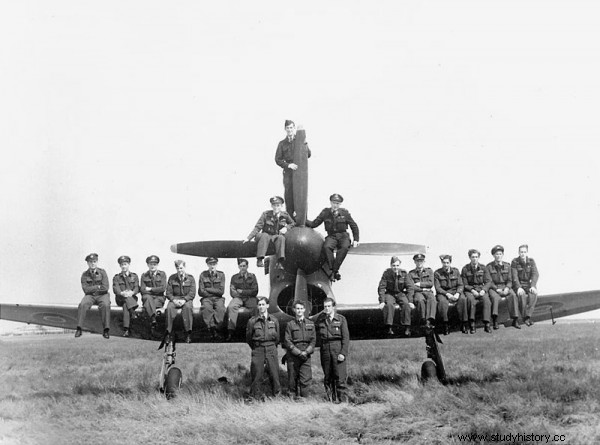
Pilots from 486 Squadron RNZAF with Tempest in Denmark
Suddenly Tempest was shaken by something and a long, narrow, sword flame appeared at its tail ... From other planes, which quickly moved to the side, you could see Brooker's gloved hands clutching at the latches of the glass cover of the cabin . Suddenly his face and torso appeared in the harsh light: fire burst into the cabin . Tempest fell onto his back in an instant, losing his balance. With a lump in their throat, Brooker's teammates stared at the helplessly swaying plane - they did not even notice two shadows emerging softly from the rainbow-colored fog by the aurora. All they saw were the fiery streak of tracer missiles and the great black crosses on the wings of the two Focke-Wulfs, which immediately vanished.
The second Tempest fell into a corkscrew and its burning debris fell onto the freeway, alongside the remains of Brooker's plane. These accidents passed unnoticed. However, Brooker was at the helm of his squadron for so long that it was hard to imagine Wing 122 without him.
Mission:Communication Paralysis
After breakfast - another trip. I'm on a mixed patrol of Squadrons 56 and 274. We fly over the Bielefeld Viaduct, which was shattered three days ago by 14 ten-ton bombs. The blast craters are over 100 meters in diameter. The main goal of our trip is to paralyze road communication in the Bielefeld, Altenbecken and Arnsberg triangle; so I divide the planes into pairs that will conduct the action independently from one another.
I am firing machine guns at two trucks filled with military - the poor people can't hear me fly, because the roar of their own engines drowns out everything. After two such passes, nothing is left in the way but two flaming skeletons and torn bodies. My number 2 is losing contact with me - I'm lonely.
Then I shoot the locomotive in the distribution station; flak attacks very sharply with projectiles with a caliber of 20 millimeters. The wing tip of my plane is torn apart. For 10 minutes I circle over the assembly point, waiting for my planes, and soon we return together to Volkel, unfortunately without Redge, who was knocked down by some Messerschmitt wandering around there. 18.50 hour. A call from Lapsley, requesting a battle-experienced four-plane patrol to watch over Rheine.
Freedom of freelancers
It seems that the Germans will try to evacuate their jets into the interior of the country, taking advantage of the last minutes of twilight. High Command insists that I lead this patrol as the planes will return at night. Is it self-love? I agree without even a moment's thought. Good Lapsley probably finds it quite natural - he remembers me from Ashford in 1943, from Normandy in 1944, and counts on my enthusiasm as always. Yes, but after 40 combat flights in 20 days my enthusiasm had cooled down somewhat .
Ashamed, however, I am calling the casino in the hope that I will find Gordon Milne there and ask for a replacement. The orderly holds me by the camera for five minutes, unable to find him, and the departure time is getting closer. It's hard ... I order the sergeant on duty to put my plane on the board. - Hello Ron, put JJ-B on the board and I'll pilot it.
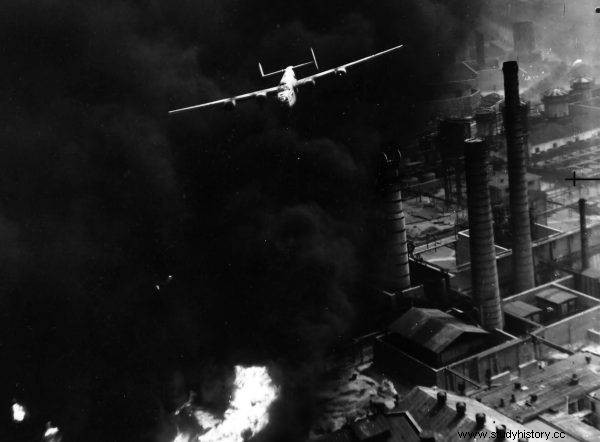
B-24 Liberator bomber named Sandman during the bombing of the Ploiești Astra Romana refinery during Operation Tidal Wave
I act prudently and take a very good team:Tiny, the Australian without words of praise, will be my number 2, Torpy - number 4, Peter West - number 3. Instructions are kept to a minimum; freedom of freelancers. Hour 19.10. We are a few kilometers from Rheine, covered in scattered pebble clouds whose huge bellies are swollen with rain. It's getting dark already, and a long strip of thick milky mist surrounds the Hopstein hills, shielding the Dortmund-Ems Canal and its dilapidated locks.
Post-disaster landscape
Rheine looks horribly bombed - its three huge hangars have collapsed, and the familiar silhouette of the control tower with its menacing flak posts has vanished. We almost feel sorry for it - how strange it is! . There seems to be a hectic liveliness there after all. In the woods along the maneuvering routes, you can make out the moving lights, and the two long, glistening streaks probably come from the jet engines of some Messerschmitt 262, getting ready to escape.
A dozen or so machines have probably escaped discreetly into the shadows. - Hello Pierre, this is idiotic but you can't see anything. - Shut your mouth! I'm sending Peter to hell, but he's right:you can't see anything. I decide to circle the airport wide at an altitude of 400 meters and come back. The sight, badly adjusted, blinds me and blindly darken it so that in the protective glass I start to distinguish a reddish circle-shaped thread.
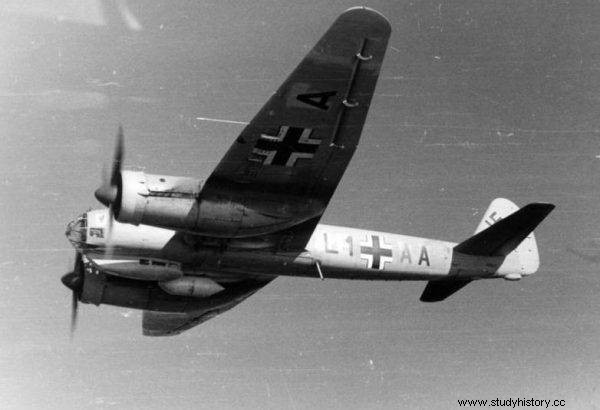
Junkers 88 - Night Fighter
One last glance around. Surprisingly, to the left of me, two thin purple streaks of exhaust gas from a twin-engined plane appear clearly. - Attention Talbot, nine o'clock attack! It is Junkers 88 Night Fighter. In a shadow that distorts proportions and blurs the distance, it seems enormous to me. I nervously throw a series of missiles at random in the direction of the escaping black mass and splash… I certainly hit it. Three blasts, short and dry as Morse's signals - and a sea of flames pours from the leaking tanks of the right wing, illuminating the long fuselage marked with a black cross ... And then, very clear against this glowing mass, the silhouette of Tempest ...
A split second nightmare - and a huge beam of light illuminates the sky ... It was poor Tiny, who was flying blindly behind me, bumped into a fatally hit Junkers before he could make the slightest move! Slowly, the cascade of white-hot debris of both burned machines dissipates and extinguishes over the Mettingen Forest, over which night falls.
Source:
The text is an excerpt from Pierre Clostermann's book "The Great Circus" (Bellona, 2022).
